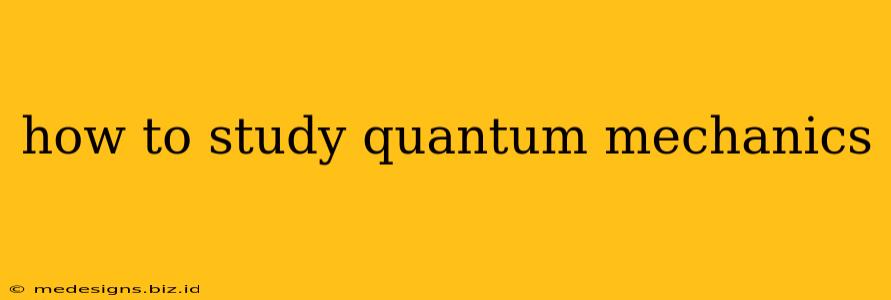Quantum mechanics. Just the name conjures images of complex equations, mind-bending paradoxes, and a general sense of bewilderment. But don't let the reputation intimidate you! While challenging, mastering quantum mechanics is achievable with the right approach and resources. This guide will equip you with a structured plan to tackle this fascinating field.
1. Laying the Foundation: Essential Prerequisites
Before diving headfirst into the quantum realm, ensure you possess a solid grasp of these foundational concepts:
- Classical Mechanics: A firm understanding of Newtonian mechanics, including kinematics, dynamics, and energy conservation, is crucial. Quantum mechanics builds upon classical concepts, though it often deviates significantly.
- Linear Algebra: This is absolutely essential. Quantum mechanics relies heavily on linear algebra, particularly vector spaces, matrices, eigenvalues, and eigenvectors. Brush up on these topics – they'll be your constant companions.
- Calculus and Differential Equations: A deep understanding of calculus (including multivariable calculus) and differential equations is vital for solving the mathematical formulations of quantum mechanics.
- Complex Numbers: Get comfortable with complex numbers and their operations. They are integral to the mathematical framework of quantum mechanics.
2. Choosing Your Learning Path: Textbooks and Resources
The right textbook can make or break your learning experience. Here are some popular choices, catering to different levels and learning styles:
- Introductory: "Quantum Mechanics for Mathematicians" by John V. Jose and Eugene J. Saletan offers a more mathematically rigorous approach. For a more physics-focused introduction, consider "Principles of Quantum Mechanics" by R. Shankar.
- Intermediate: "Quantum Mechanics" by David Griffiths is a widely used and well-regarded textbook. It balances mathematical rigor with physical intuition.
- Advanced: "Quantum Mechanics" by Cohen-Tannoudji, Diu, and Laloe is a comprehensive and challenging text suitable for advanced undergraduates and graduate students.
Beyond textbooks, consider supplementing your learning with:
- Online Courses: Platforms like Coursera, edX, and Khan Academy offer excellent quantum mechanics courses, often taught by leading experts.
- YouTube Channels: Many YouTube channels provide insightful explanations and visual aids to complement textbook learning. Search for channels focused on physics education.
- Problem Solving: Working through problems is crucial for understanding quantum mechanics. Each textbook will have a problem section – make sure to tackle a good number of them.
3. Mastering the Concepts: A Step-by-Step Approach
Quantum mechanics is best tackled systematically. Focus on understanding the fundamental concepts before moving on to more advanced topics. Here’s a suggested order:
- Postulates of Quantum Mechanics: Begin by understanding the fundamental postulates. These are the basic axioms upon which the theory is built.
- Schrödinger Equation: Learn to solve the time-independent and time-dependent Schrödinger equations for simple systems like the particle in a box and the harmonic oscillator.
- Operators and Observables: Understand the role of operators in quantum mechanics and their connection to physical observables.
- Quantum Measurement: Grasp the concept of quantum measurement and its probabilistic nature. Understand expectation values and uncertainties.
- Hydrogen Atom: Solving the Schrödinger equation for the hydrogen atom is a significant milestone. Understand the energy levels and wave functions.
- Angular Momentum: Develop a strong understanding of angular momentum in quantum mechanics.
- Identical Particles: Learn about bosons and fermions and their implications.
- Approximation Methods: Explore approximation methods like perturbation theory and variational methods for solving more complex systems.
4. Practice, Practice, Practice!
The key to mastering quantum mechanics is consistent practice. Regularly work through problems, both simple and complex. Don't be afraid to seek help when you get stuck – discuss challenging concepts with classmates, professors, or online communities.
5. Connecting the Dots: Building Intuition
Quantum mechanics can feel abstract and counterintuitive. To overcome this, actively try to connect the mathematical formalism to physical phenomena. Visualize the wave functions and interpret the results in terms of observable quantities.
By following these steps and dedicating sufficient time and effort, you can successfully navigate the fascinating world of quantum mechanics. Remember, the journey may be challenging, but the rewards of understanding this fundamental theory are immense.
